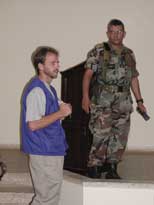by Jess Hunter-Bowman, WFP Associate DirectorSooner or later the truth has a way of showing its face. Recently, an important sliver of truth came out of Colombia.
In 1999 and 2000, the Clinton Administration and key congressional offices were wringing their hands over how to convince skeptical figures on Capitol Hill and across the U.S. that funding the Colombian Army—the army with the worst human rights record in the hemisphere—was a good idea, or even legal. Since every single Colombian army brigade was too dirty to fund, the Pentagon’s brilliant solution to the impasse was to create an entirely new brigade—a counternarcotics brigade with only “clean” soldiers hand picked out of dirty units.
$1.3 billion dollars soon began to flow from Washington to Putumayo, ground zero for Plan Colombia. 
Soon thereafter, Witness for Peace staff in Colombia took a delegation to Putumayo to assess the situation and stand with the conflict’s victims. During our time there, the group visited the Santana military base and spoke with a Colombian Army Colonel—the commander of a battalion in the counternarcotics brigade. The delegation had been told of countless people killed at the hands of paramilitaries and guerrillas in the area. The paramilitaries were particularly vicious as they moved into the area, brutal massacres being their calling card. Thousands were killed.
On our way to the military base—just a few miles outside of town—we passed Villa Sandra. This farm, we were told time and time again, was the operating base for the paramilitaries in the area.
This paramilitary headquarters was just minutes down the road from the Santana military base—now home to the U.S.-funded counternarcotics battalion.
When the WFP delegation asked the Army Colonel about the paramilitaries in Putumayo, he downplayed their presence in the area and denied the military had any relationship with them. That was before he told the group about his training at the School of the Americas.
WFP took what it had seen and heard to the U.S. Embassy in Bogota and was told the billions in U.S. military aid was only flowing to vetted units—army battalions with no relationship with the paramilitaries, much less involved in human rights abuses.
We took what we’d learned to Washington and were told that the Colombian military was an important ally in the drug war and couldn’t be involved with death squads.
Now, years later, the truth told to us by brave farmers, priests and community organizers in Putumayo has been confirmed by the paramilitaries themselves.
Thanks to our colleague Adam Isacson at the Center for International Policy, we recently learned that John Jairo Rentería Zúñiga, alias “Betún,” a demobilized member of the paramilitaries Southern Front of Putumayo has begun to talk.
“At that farm (Villa Sandra) we had a permanent group, and that is where (paramilitaries) from town brought the people they were going to kill, they handed them over, they executed them and they buried them over there. There are a lot of people in graves, I believe some 800 people,” said alias “Betún”.
He indicated the decision to stop killing people in town was due to a request from the police force. “They asked us not to kill any more people in town, because it created problems for them, so (the police) gave the order that anyone they wanted to kill should be brought to the farm and buried there.”
He testified that the police, the army and the navy worked closely with the paramilitaries.
“We decided to coordinate with (the army). Initially, they told us to stay on the edge of town, later they told us that we could stay in the town, and we came in uniform. Also, they came to our base and rode in our vehicles, and we rode in their vehicles too.”
"When we needed some support, they were there, and when they needed support they’d ask it of us. Meetings were held with their commanders and our commanders, and we had our radio frequencies coordinated.”
To date, no one knows exactly how many people were killed in Putumayo in Plan Colombia’s early years. By 2002 the homicide rate in this part of Putumayo was 123 times the rate in the U.S. during the same year. The Attorney General’s office estimates at least 3,000 people killed by the paramilitaries in Putumayo were buried in mass graves such as the one estimated to have 800 bodies, buried right under the nose of the U.S.-backed Colombian military.













 Carolina worries about the future
Carolina worries about the future Onelia shares her story
Onelia shares her story


















